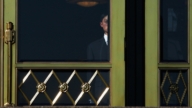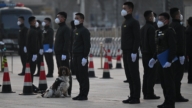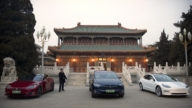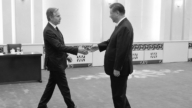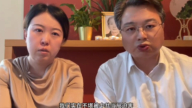【新唐人2013年07月08日讯】自去年以来的中国地方换届已经结束,中国各省级人大、政府、政协,共选举产生领导官员800多人。消息指出,目前22名省长中,有11人曾在中央部委或中央企业任职,而且都是“空降”,媒体认为,这反映为习、李政权强势掌控地方人事。有分析表示,习近平为了与江派抗衡,联合团派,掌控地方局势。不过也有分析认为,很多中共官员都是为了个人利益,才站到习、李一边,一旦触动他们的核心利益,他们也会联合起来调转枪口。
近两年来,中央政府或央企官员外调,担任地方首脑已成为普遍现象。香港《南华早报》统计发现,中国大陆除4个直辖市和5个少数民族自治区外,目前内地22个省级行政区的首脑官员中,一半都是“空降”,且调动多集中在过去一年。
报导说,关注中国政治的分析人士普遍认为,北京正在不断加强中央集权,对地方政府施加控制力。报导引述专家的分析表示,北京对地方加强控制的另一个重要标志,是对省长的选择。过去二十多年里,党委书记都是外调,可能来自其他省份,也可能来自北京。但同时,省长多为本地成长起来的干部,或至少来自其他省份,以保证对地方事务的熟悉。但这两年,“空降”省长的状况,已与过往大不相同。
有媒体报导,习近平为了回报前任领导人胡锦涛,“空降”团派人员到地方作封疆大吏。
时事评论员林子旭﹕“事实上,习近平过去很多年一直在地方任职,自己培养的人很有限,目前只有胡、温留下来的人,习近平用的才放心,与其说是回报,不如说是胡、温、习、李互相依存吧﹗这么多年江派势力在地方上,或明或暗的培植了大量的官员,这股力量也不可小视,因此,习近平大量的从中央‘空降’自己信得过的人,去控制地方的局面也就成了一种必然。”
美国“纽约城市大学”政治学教授夏明﹕“西方国家的话,它有反对党当政,当然会把前面政党的所谓政务官都给更换。但在中国,因为它没有反对党,它一直是由中国共产党在进行执政,即使退休的领导人,他还会发生很久的余热。”
6月下旬,习近平在中共中央政治局会议中告诫政治局委员,要带头自觉维护中央权威。香港媒体评论认为,这显示习对政治局的内讧问题甚为脑火。
林子旭﹕“习近平上位以后,与江派势力的权斗一直就没有断过,最近习近平公开抛开中共虚假的表面的所谓团结,公开讲出:政治局的同志带头自觉维护中央的权威等一番话,大有一种和江派势力有我没你、玩到底的意味﹗可以预见在未来的日子里,这种人事变动可能会更加的剧烈,甚至真的有可能真的进入政治局常委会。”
不过,林子旭认为,不管习近平掌握多少亲信和权力,就算江派势力全部瘫痪,在中共体制内,习近平即便拥有权力也很难做事。
林子旭﹕“中共的官员不管是江派的还是别的派别的,说到底,这些人都是中共的官员,他们很多人都是为了个人利益,才站到习近平一边,真的触动了他们的核心利益,他们都会联合起来调转枪口的。说白了,在中共体制的制约之下,习近平看起来好像很有权力,但是本质上也不过就是中共体制的魁儡罢了﹗”
时事评论员刘淇昆﹕“因为官员他不是民选的,不是老百姓决定,是由上级提拔的,这个官位不是老百姓给他的,因此共产党的官员不代表老百姓的利益,甚至不顾老百姓的死活,他效忠的是提拔他的人,为了他的升官发财,就要捞钱了,就要拉关系,就要贪污受贿,一拨人上来了,捞够了,再上来一拨人,又跟饿狼似的再捞,受苦的是老百姓啊﹗”
另外,据大陆《南方周末》统计,到上个月底,中央已向地方31个省份“空降”118名司局级以上干部,约占591名在任地方党政领导的20%。
采访/常春 编辑/周平 后制/李勇
Xi and Li’s Control Tactics? Half of Newly Appointed Local Level Officials Worked for Central Government.
In China, transition to new Provincial People’s Congress
leaderships, governments, and CPPCC has completed.
More than 800 officials are involved.
Of 22 provincial governors, 11 used
to work for the central government.
This seems to reflect how Xi and Li
are controlling local governments.
This tactic to unite with the Communist Youth League
faction is believed to be to control the Jiang faction.
It is also believed that when necessary, these people will
turn against each other in conflicts of personal interest.
Over the past two years, central officials’ redeployment
to local leaders has become a common phenomenon.
According to a report from Hong Kong based South
China Morning Post, of 22 provincial governors,
half were appointed from outside of the province.
The majority of these transitions took place last year.
It was analyzed that Beijing is
centralizing control of local officials.
The choice of local leaders also
reflects tightened control from Beijing.
For more than 20 years, provincial party secretaries
have been deployed from outside of the province.
The majority of provincial governors came from
local areas, to ensure familiarity with local affairs.
But for the past two years, the choice
for governor has also changed.
Xi Jinping reportedly deployed officials with a Communist
youth league background, to return a favor to Hu Jintao.
Lin Zixu, commentator: “In fact, Xi Jinping
spent many years at the local office level.
His relation to central government has been limited.
He is only comfortable with people
associated with Hu Jintao and Wen Jiabao.
Rather than to return a favor, I’d like to believe it is
a mutual dependence between Hu, Wen, Xi, and Li.
Jiang has overtly or covertly developed
many forces at the local level, and Xi needs
to control Jiang’s forces with his central allies.”
Ming Xia, Political Science Professor
at City University, New York:
“Replacing opponents during political party
transitions is normal for Western countries.
However, the opposition party does not exist in China.
Leaders, even the retired ones, will thus
remain an influence for a very long time.”
In late June, Xi Jinping warned at a Politburo meeting
for a need to consciously safeguard central authorities.
Hong Kong media commented that Xi’s talk reflected
his anger over the infighting within the Politburo.
Lin Zixu: “Xi Jinping’s struggle with Jiang’s faction
has been a factor ever since he came to power.
He even put aside the false unity image of the CCP and told
the Politburo committee to safeguard the central authorities.
This indicates to Jiang’s faction about
his determination to fight to the end.
Personnel shifts at the Politburo
Standing Committee is now foreseeable.”
However, Lin Zixu does not believe Xi Jinping will
make much difference, even if the Jiang faction is gone.
Lin Zixu: “After all, they all work for the Communist Party.
Out of personal interest, they took the side of Xi Jinping.
When conflict arises, they will turn against Xi for sure.
Under the Communist regime, Xi Jinping’s
power is in fact just another puppet show.”
Liu Qikun, political commentator: “None
of the Communist officials were elected.
They were all promoted by their superiors.
None of them care about the general public.
They are only subordinate to their superiors.
They bribe to get connections, and profit through
connections. It is the Chinese people who suffer.”
In addition, the Southern Weekly analyzed that
up until the end of last month,
118 departmental cadres have been deployed
from the central level to 31 provinces.
They account for about 20% of
local party and government leaders.



